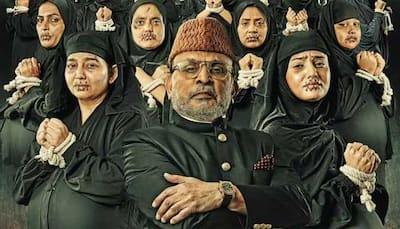
New Delhi: In a notable development on Friday, the Supreme Court dismissed a writ petition seeking the revocation of the Central Board of Film Certification (CBFC) certification granted to the film ‘Hamare Baarah,’ directed by Kamal Chandra and starring Annu Kapoor. The plea was presented to a vacation bench led by Justice Vikram Nath, who declared the court’s unwillingness to hear the plea on its merits. Justice Nath, joined by Justice S.V.N. Bhatti, emphasized that the matter should be contested through the appropriate judicial hierarchy.
“You should challenge the Bombay High Court’s decision. The film has been screened, and the judges there have reviewed it. They have already ordered the deletion of several scenes, shots, and dialogues. It would be more suitable for this court to consider the matter if an appeal is filed,” the bench advised the petitioner’s counsel.
Given the court’s evident reluctance, the petitioner’s counsel requested permission to withdraw the writ petition. Consequently, the Supreme Court dismissed the plea as withdrawn and granted the petitioner’s liberty to file a special leave petition against the Bombay High Court’s order that permitted the release of the film on June 21.
In an earlier decision on Wednesday, the Bombay High Court cleared the release of the film with specific modifications to its contentious content. The petition filed under Article 32 of the Constitution had contended that the film suggested Muslim women lack independent rights and implicated the Muslim community in India’s rising population.
“The film’s director and producers target a specific community, portraying Muslim women as enslaved and subjugated by male members. Verse 223 of the Surah Baqarah Chapter 2 of the Holy Quran is misinterpreted, falsely suggesting that it permits Muslim males to treat Muslim females as chattel and exploit them,” stated the petition filed by advocate Syed Mehdi Imam.
Directed by Kamal Chandra, ‘Hamare Baarah’ features an ensemble cast including Ashwini Kalsekar, Rahul Bagga, Manoj Joshi, Aditi Bhatpahri, Paritosh Tiwari, Parth Samthaan, and Shaan Saxena.
The controversy surrounding the film gained momentum after the release of its trailer.
. It prompted a section of Muslim intellectuals to raise objections, arguing that it grossly misrepresents Islam and aims to defame the religion and the Muslim community.
“The Bombay High Court’s review ensured the expunging of objectionable content. Therefore, any more grievances should ideally be addressed through appropriate legal channels,” reiterated the Supreme Court’s bench.
The film’s petition cited glaring misinterpretations of the Quranic verses, accusing the filmmaker of fostering harmful stereotypes about Muslim women’s social status. The claim stressed that such portrayals exacerbate existing prejudices and misinform the public about a vast and diverse community.
Despite the legal battles, ‘Hamare Baarah’ is set to hit cinemas with approved alterations. The judicially-mandated changes underscore the importance of balancing creative freedom with social responsibility, especially in a country as diverse as India.
“The director and producers of the film seem to be intent on maligning a section of society,” articulated Imam’s petition. Kamal Chandra, however, maintains that the film’s portrayal is aligned with his directorial vision of depicting social realities, albeit in a dramatic form.
The dialogue around ‘Hamare Baarah’ touches on broader issues of creative expression versus social responsibility and sensibility. With rapidly changing public sentiments and legal precedents, the industry faces a delicate balancing act.
After its trailer’s release, the ensuing public discourse reflected varying perspectives. Some defended the film under the banner of artistic freedom, while others called for more caution to avoid propagating misleading stereotypes.
This complex case has once again cast a spotlight on the pivotal role of certification boards like CBFC, which must weigh artistic expression against societal harmony. The Supreme Court’s suggestion to appeal through appropriate channels reinforces the importance of procedural propriety in judicial reviews.
As the conversation continues, filmmakers and audiences alike will be watching to see how precedents set by ‘Hamare Baarah’ might influence future projects and decision-making processes within the Indian film certification landscape.
Directed by Kamal Chandra, ‘Hamare Baarah’ and its cast including Ashwini Kalsekar, Rahul Bagga, Manoj Joshi, Aditi Bhatpahri, Paritosh Tiwari, Parth Samthaan, and Shaan Saxena continue to be at the center of this significant legal and cultural dialogue. The Supreme Court’s dismissal of the plea, allowing for an appeal, suggests that this debate is far from over, potentially setting the stage for further judicial examination and broader societal reflection.












